El efecto de la historia sobre el cambio semántico en el español peninsular
The Effect of History on Semantic Change in Spanish
Author(s): José-Manuel Pazos-BretañaSubject(s): Language and Literature Studies
Published by: Instytut Studiów Iberyjskich i Iberoamerykańskich, Wydział Neofilologii, Uniwersytet Warszawski
Keywords: lexicology; culture; history; semantics; semantic change
Summary/Abstract: Semantic change is a manifestation of the evolution of the semantic content of a word. We propose the study of semantic change linked to specific historical events and sociolinguistic situations, for example, the semantic connotations associated with everyday terms as España in various autonomous regions, demand its replacement by an euphemism Estado. Our hypothesis is that language adapts, if necessary, with an extraordinary agility to fulfill the need to express new, sometimes extraordinarily complex, realities not only through the use of neologisms (e.g., balompié), but also expanding, recycling or recreating the semantic load of heritage words (e.g., terrateniente). We propose to study and illustrate how language reflects the ideological and religious adherence of certain users of lexemes or word units (e.g., derechona, brotes verdes) and to provide, wherever possible, a link to the historical facts where they are born.
Journal: Itinerarios
- Issue Year: 2016
- Issue No: 23
- Page Range: 123-139
- Page Count: 17
- Language: Spanish

